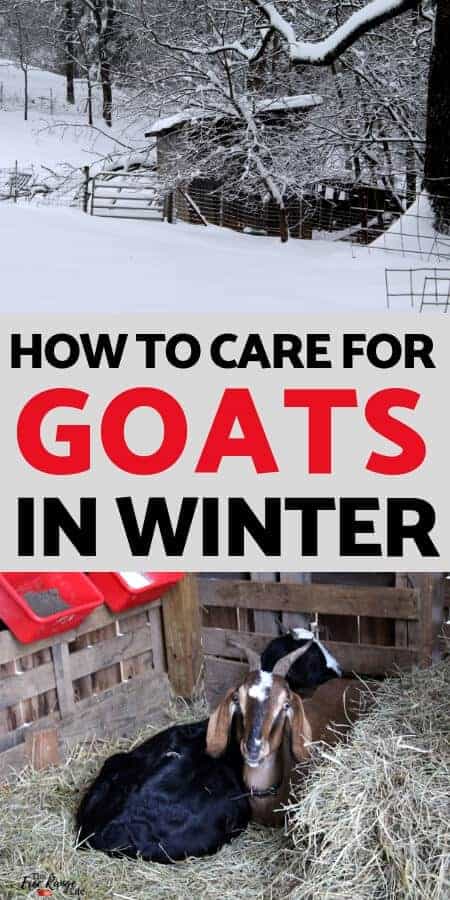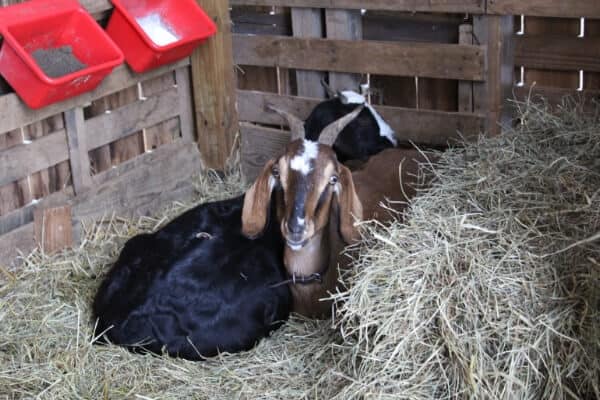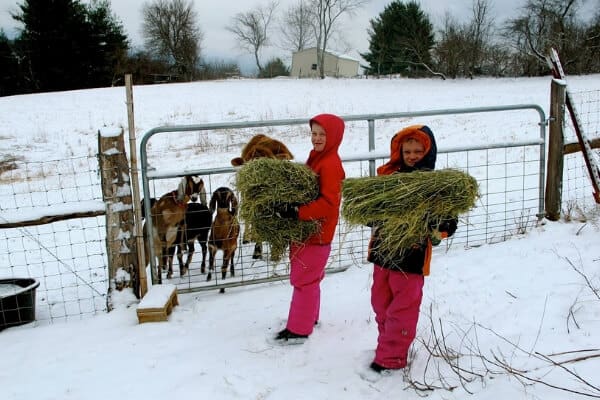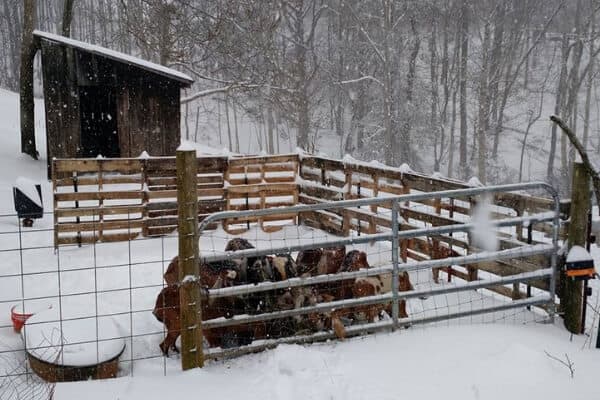Caring for goats in winter can have its challenges. Goats are very hardy animals, but you do need to aware of the differences between caring for goats in warm weather and caring for them in cold weather- especially when there is snow on the ground or in very cold temperatures.
So how is it different and what do you need to know about caring for your goat herd during the cold winter months?
This site contains affiliate links. If you make a purchase using one of these links, I may earn a commission. Please see my disclosure page for more information about cookies collected and our privacy policy.
Caring for Goats in Winter- What You Need to Know
Shelter Needs for Goats in Winter
Goats need shelter. You can read about the basic space requirements for goats, and in the winter time making sure they have adequate space is even more important.
When it is cold and snowy goats will be indoors more often than not, so you don’t want them to be overcrowded since that can cause stress and illness.
Your shelter needs to be fully enclosed or 3 sided with the open side being away from the wind. If you live in a windy area, you need to make sure that the open side is not in the direction the wind normally blows.
You should also check your barn before winter hits to ensure that your barn isn’t too drafty and make any repairs to block up drafty areas.
Like always, your barn should be dry, so check drainage so that snow melt doesn’t soak your barn.
Bedding for Your Goats in Winter
What about bedding?
In the summertime it’s fine to keep your goats on a dirt ground. But in winter, you should be bedding down your barns and stalls to help keep your goats warm.
Straw is usually the best for this purpose. Your goats will also lose hay and use the wasted, dropped hay on the ground as bedding.
We like to use the deep litter method in our barns. This means we layer new straw on top of the old straw. This helps build up a barrier between the cold ground and your goats.
It also makes it so that you don’ t have to muck out the barns in the miserable cold weather! The bottom layer will also build up heat as it composts- perfect for your spring garden!
Do Goats Need Supplemental Heat?
The short answer here is NO.
Goats do not need to be in a heated barn.
And do not use a heat lamp.
If they are properly fed and in a draft free barn with lots of bedding and other goats to snuggle down with they will be just fine.
Food and Water Needs for Goats in Winter
Feeding and watering goats in winter can be a real chore. Especially if you are not quite set up for it!
So it takes a little extra time and effort to make sure the goats get everything they need to stay healthy.
Feeding Goats in Cold Weather
Goats will need extra hay in the winter. If you are in the south, where there is some forage, then you can take advantage. But if you are in an area that has very cold temperatures or a lot of snow, you will need to keep your goats in hay at all times.
Feeding during the snow is very important. Your goats will not leave the barn and there will be ZERO forage. No bark, no crunchy weeds, nothing. So make sure you check their hay and keep replenishing their supply.
A goat’s rumen will help heat them from the inside, so the more they can eat, the warmer they will be.
Since winter tends to run at the same time as breeding, many of your goats will be pregnant (or in rut) during the winter months. So make sure they are getting adequate nutrition at all times.
Get out that shovel and make a path to the barn when it snows so you can safely get all your goats food and water daily.
How To Keep Goat Water From Freezing in Winter
One of the hardest parts about raising goats in the winter is keeping them in water. None of our barns have electricity, and only one is close enough to an electric source to run a cord.
If you have access I definitely recommend getting a heated water trough.
If you can’t, you need to make sure that you break open frozen water daily- or multiple times daily.
We carry buckets and jugs of hot water out to the goats and chickens to help defrost solid ice morning and night.
Goats also like to drink the hot water, and it will help them warm up from the inside out. (This helps keep chickens warm too!)
You can make a batch of goat electrolytes with warm water and give them that on really cold days too.
Winter Goat Care- Things to Watch For
Goats can get stressed very easily. And one thing that is very stressful on a goat’s body is big temperature swings.
In our area we get 50 degree days and then 2 days later it doesn’t get above 20 degrees. And that is really hard for a goat!
Check your goats daily for signs of cold and stress. Look for things like shivering, drainage from their eyes or nose, and refusal to eat.
If you notice any of these symptoms, take their temperature- which should be 102-103 (give or take a degree for extreme outdoor temperature).
And consider giving them some warm electrolytes, B vitamins, and Nutri-drench (check my goat resource page for where to get these).
Pneumonia is something all goat owners should be aware of and can take down a goat in less than 4 hours and one of the top causes of pneumonia is the drastic swings in temperature and overcrowding in barns.So be aware of the signs of pneumonia and act fast if you notice signs.
Overall, if you keep your goats in a draft free, dry, shelter and give them the proper feed and water they will be less stressed and be able to make it through the winter just fine







I have noticed my goats getting very big this winter. I have heard of hay belly being a thing. I give them a very small amount of grain once a day and have even cut that out times. They get a second cutting alfalfa grass mix hay or an all grass hay. Is there a way to stop the large bellies? I know it’s not bloat too. They are perfectly normal otherwise.
What breed are they? How old? Some breeds get that look easier than others. And in kids and younger goats in CAN be a sign of malnutrition and it sometimes can mean a high worm load. But MOST of the time, it’s totally normal and just the sign of a healthy rumen producing lots of gas. Does it come and go as they chow down on hay?
Be sure you have free choice baking soda for them so they can use it when necessary.
What is bakeing soda for. And is it just during the winter you give them hot water and how hot for drinking.
Ours are always fat no matter what and they never stop eating.
my goats love corn, and hay second choice
I’ve noticed shivers from my goats & I immediately put them back in the house & feed them. When it’s freezing outside I will lock them up.
The information are valuable and may be a source of good guide for the beginners in goat farming.
I always see the baking soda comments. I put it out and have never had any eaten, used or even licked. 🤷♀️ I have 6 N Dwarf wethers ages 2 years down to 6 months
Hi Ginny!About the baking soda- it’s good for teeth and heartburn and indigestion and other things. Try to mix small amounts in their feed occasionally. It’s not going to hurt anythng.
What type of baking soda and how much do you give? I have 3 N Dwarfs. Thanks
My 2 goats eat all the baking soda I give them whiten 2 days and I give them a lot.
I haul hot water (as hot as my tap will run) out to the goats every morning in cold weather, and in the evening too if it’s cold enough to start freezing the bucket by evening. They love it. Especially needed for does in milk, to help them drink a lot. I call it giving them their hot tea, though it’s just water. Wish I had hot water plumbed into the barn!
Love your info, Thanks a Bunch! I keep baking Soda out all the time in containers hung up where they can reach it & out of weatherplus, I mix some in their feed when I think their not eating it! But Goats are smart & know when they need it pretty much. I have a full blooded boar who eats all the time & looks fat as a pig, so baking soda is something I make sure she gets down! And their wormed & checked. A vet years ago told me that children’s triment cold med won’t hurt animals & when a cold/ cough starts I carefully use drops in giving my goats some, it works great for ME/ THEM! I’m a Mother so in my old age & years Common Sense kicks in for my Kids😊 too! Been worrying about this winters care task, Thanks for the info & ideas. My biggest task will be when one gives birth, or how to tell their PG🙄 yet! I lost my first babe last february… don’t want that to happen ever again, she was beautiful. Oh yes, can goats really eat pine needles? Thanks
Mi Nigerians LOVE branches that have fallen off the pine trees after a wind storm and will actually fight over them,so I’ve learned to make sure I have lots to toss around all at once.
When it comes to baking soda..it’s just regular old baking soda that comes in the little box. Nothing fancy. I usually add it into their food so it gets coated then put in their individual dishes so I know they get it. They tend to push ea other off a dish and go to another so this way I know they are getting it if it’s all covered.